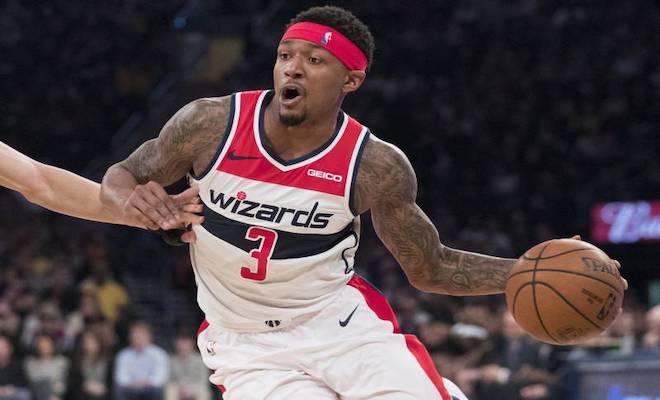-
 April 16, 2020, 12:08 pm
April 16, 2020, 12:08 pmIt’s no secret that Wizards fans came into the 2019-20 season with limited expectations and lots of uncertainty about the future of a franchise that saw its leader, John Wall, suffer a devastating Achilles injury that was projected to sideline him for the entire NBA calendar year. Many NBA experts projected Washington to be one of the worst teams in the league, and while change was somewhat imminent, there weren’t many options on the table and rival teams were drooling over potentially being able to drag Bradley Beal away from the nation’s capital.
After 16 seasons of Ernest Grunfeld running the basketball operations, the team was in salary cap hell and the roster had plenty of holes. For years, the Wizards followed the same pattern, acquiring veterans like Trevor Ariza and Jeff Green for first round picks and refusing to trade them away, only to watch them walk in free agency for nothing. The lack of youth was a direct result of multiple first round picks being shipped away in recent years and the burden fell on Japanese-American forward Rui Hachimura to restore some hope in a franchise that clearly was moving to a new direction.
Everything pretty much starts from the top of an organization though, and Ted Leonsis eventually owned the situation and decided to steer the franchise to a more modern approach.
“Last year we thought the Wizards were a 50-win team and we lost 50 games,” Leonsis said. “We had an existential experience, and I had to take responsibility for it.”
Reshaping the Front Office
Successful NBA franchises traditionally have strong front offices and a variety of supportive personnel in their scouting, analytics and player development departments since more voices bring more ideas and more options to the people in charge of making the decisions. The Wizards were operating with a depleted front office in the last few years as Leonsis invested in the latest technologies, built a $70 million practice facility, and even paid the luxury tax, while failing to put faith in the right basketball people.
Thankfully this changed this last summer when a revamped, three-faced front-office structure called Monumental Basketball, that focuses on basketball operations, player services and player health and wellness for the Wizards, the Mystics, the Capital City Go-Go (G League) and the Wizards District Gaming (2K League), was established.
While the Wizards tried to unsuccessfully indulge Tim Connelly to leave Denver, they quickly removed the interim tag from former Senior Vice President of Basketball Operations Tommy Sheppard who took over the role of general manager and has earned a reputation as one of the league’s most innovative and creative executives. Washington also added former Cleveland Browns executive Sashi Brown (who was known as the NFL’s Sam Hinkie), to serve as chief planning and operations officer, analytics guru Dean Oliver, Daniel Medina as chief of athlete care & performance and former Georgetown Hoya head coach John Thompson III to act as the head of a new athlete development and engagement department.
With limited financial flexibility the Wizards had to maximize all of their resources and Sheppard quickly proved that he was able to execute the kind of low-risk, high-reward peripheral transactions that turned franchises like the Nets and the Clippers around in recent years.
Sheppard flipped Aaron White, a former second-round pick who was stashed in Europe, for Davis Bertans, who has quickly become one of the best shooters in the NBA. He turned cap space into Moritz Wagner and Isaac Bonga, two guys with intriguing potential, and he sent Isaiah Thomas to the Clippers for former first round pick Jerome Robinson.
Sheppard was clear that, with John Wall effectively out for the season and most of Washington’s training camp roster full of new faces, this season was all about building up the next group of core players who could be part of a future contending Washington team.
Scott Brooks’ Rotation & the Team’s Young Core
It has now been almost four years since Scott Brooks inked a five-year, $35 million contract, becoming one of the highest paid head coaches in the NBA. The Wizards thought highly of his work in Oklahoma City and he was brought in as the coach that could move the needle for a core centered around John Wall, Bradley Beal and Otto Porter, aiming to reach the Eastern Conference Finals. That scenario clearly didn’t materialize as the Wizards have yet to win 50 games and a combination of injuries and lack of talent simply kept them away from any kind of success in recent years.
Brooks entered the offseason with a dark cloud above his head as the obvious question was whether he is the right choice for the group now in place but Sheppard showed an unwavering commitment to him as the team’s head coach. There was never any evidence to suggest that Sheppard was preparing to fire Brooks just because he is now in control of basketball operations and the two men had an honest conversation about the team’s direction and the expectations for the current season. The wins and losses weren’t going to matter as much, despite Brooks proving to be incapable of taking the team to “the next level” and the emphasis was now on the developmental side.
Brooks has had his justified share of criticism throughout his years with the Thunder and the Wizards but the truth of the matter is that he has shown an exceptional track record as a player development coach, helping Kevin Durant, James Harden and Russell Westbrook become the league’s alpha dogs while also doing similar work in DC with Otto Porter and Kelly Oubre Jr.
With a 24-40 record so far this year, the results have exceeded expectations with Washington scoring 115.6 points per game (good for 6th in the NBA), as Brooks had his team fly up and down the court and providing the league with one of its most entertaining teams to watch on a nightly basis. The Rockets – Wizards game at the end of October with a 159-158 score was a classic.
What’s even more important, Thomas Bryant, Rui Hachimura, Moritz Wagner, Troy Brown Jr., Isaac Bonga and even two-way player Garrison Mathews have all taken leaps in their game, becoming key pieces for a franchise looking to quickly move back to contention.
On the fantasy front, Bryant has proved to be a reliable source of rebounds, triples and blocks during a career year where only health and a surprising 1.3 turnovers per game have kept him outside of the top-100.
Brown has struggled with consistency but he has shown the exceptional ball-handling and passing skills which make him a potentially ideal fit as the long-term small forward who can defend (1.2 steals), shoot the three (0.8 per game) and help his offense as another strong creator; don’t forget the kid is just 20 years old.
Hachimura, meanwhile, has had a nice rookie year overall, developing as an effective scorer close to the basket by using his athleticism, but he needs to shoot the 3-point shot better (only 27.4 percent this year) and grow as a defender. The Japanese-born forward spent most of his possessions defending opposing power forwards and centers which might be too much to ask for an undersized kid who stands only at 6’8”, but he has shown the willingness to learn from his mistakes.
Bradley Beal; All-Star & Future Wizard
One of the most intriguing questions heading into this NBA season, and potentially into next summer, as well as Tommy Sheppard’s biggest challenge after he got control of basketball operations, was how long Bradley Beal was going to stick with the Wizards.
Earlier in the summer the Wizards, on the first day they were eligible to do so, offered Beal a three-year max extension worth $111 million, but he did not sign it since it didn’t make a lot of sense financially. If Beal made one of the three All-NBA teams this year, he was supposed to be eligible for a five-year super-max extension worth north of $220 million in the summer.
The two parties eventually came to a win-win agreement, by signing a two-year contract extension worth $72 million that postponed any immediate trade talk and pretty much gave the franchise another opportunity to prove that they are able to build a contender. This happened after a meeting in Chicago between him, his representatives and Wizards’ brass where the team laid out the plan of the franchise moving forward. “I just felt comfortable with where we were going,” Beal said. “I talked to Ted and they kind of projected the future and gave me the layout of what we can do in the future.”
With the distraction of the contract extension and the trade rumors surrounding his future being put on hold Beal was able to concentrate on leading this young squad. After a few ups-and-downs the team developed an identity and the charismatic shooting guard has been having an admirable season while helping his teammates develop.
We can talk as much as we want about who deserves to make the All-Star game and the criteria for who makes the cut and who doesn’t, but the truth of the matter is that Bradley Beal was having the best season of his career and played like an All-Star, averaging 30.5 points, 6.1 assists, 4.2 rebounds, 1.2 steals and 3.0 triples per game on 45/35/84 shooting in 57 starts, quietly returning top-10 value in standard leagues. Beal’s exclusion was a major surprise given that he was ranked second in the player voting numbers and he became the first player since World B. Free in 1978-79 to average at least 28.7 points per game and not be named an All-Star.
This of course came after Beal has recovered from the injury woes that plagued him in his early years, and he has now started all 221 games in the last two and a half seasons.
John Wall & Other Future Questions
Wall’s recovery from the torn Achilles has gone really well according to all reports coming out of DC and videos of him practicing with the coaching staff just before the league’s pause put faith in a potential return this season but Sheppard was quick to dismiss this kind of talk. Wall is consuming 35 percent of the team’s salary cap and there are no guarantees of him returning to his All-Star form once he comes back, but all signs point to Washington moving on with the current duo of Beal and Wall and the young talent around them.
Not everything is perfect with the current group as the Wizards were tied with the Hawks this year, surrendering a league-worst 119.7 points per contest, while their defensive rating of 115.0 was outright last. It’s certain that this is an issue that will have to be addressed during the offseason.
Washington unleashed Davis Bertans, who proved to be more than a bench player, and after making 200 made 3-pointers, good for seventh in the NBA, it’s clear that there will be a lot of competition for his services. There was reportedly interest from NBA teams in Bertans before the trade deadline, but Sheppard did not seriously entertain any offers, stating that the team will be signing the talented forward to a long-term contract in the offseason.
This has been a season towards the right direction and it looks very likely that Washington could be right back in the hunt for a top-four seed next year and maybe this time the complementary parts can help this team take the next step.
Thank you for reading our series of “Season So Far” features and please stay home and stay safe until things get back to normal. Follow all our news posted on our website and on our Twitter account @HoopBallFantasy.
Subscribe
Login
0 Comments

